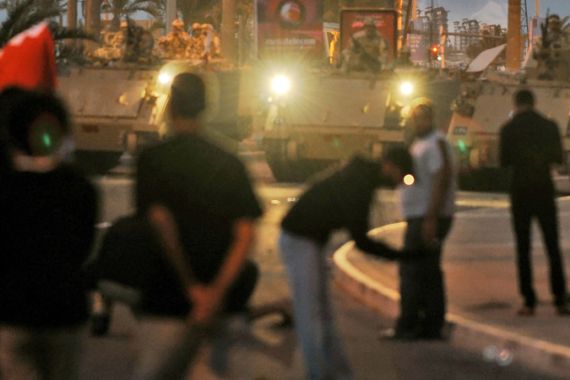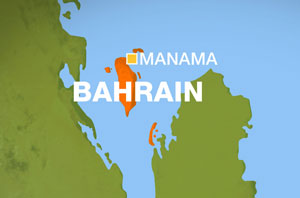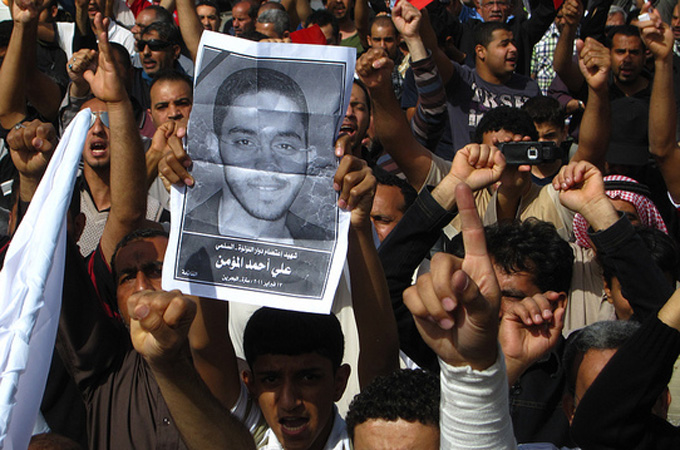Bahraini protesters fired upon
Troops use live fire around Pearl roundabout in capital Manama, as opposition rejects royal family’s call for talks.

| [WARNING: This video contains images that some viewers may find disturbing] |
Soldiers near the Pearl roundabout in Manama, the Bahraini capital, have fired upon pro-democracy protesters, and opposition political leaders have rejected the royal family’s call for a “national dialogue”.
Abdul Jalil Khalil Ibrahim, the head of the main opposition Wefaq bloc, said on Saturday that the government must resign and the army must withdraw in order for any talks with the ruling family to take place.
Ibrahim Mattar, a member of the group, which quit parliament on Thursday, said his party did not believe there was a “serious will for dialogue because the military is in the streets”.
Sheikh Hamad ibn Isa Al Khalifa, the King of Bahrain, had earlier asked Sheikh Salman bin Hamad al-Khalifa, the crown prince, to start a national dialogue “with all parties”.
|
|
| Al Jazeera’s web producer reports that doctors are preparing to receive casualities at the city’s main hospital |
Also on Saturday, Catherine Ashton, the European Union’s foreign policy chief, called for the dialogue process to begin “without delay”. She also said that she was “deeply concerned” by reports of the use of violence by security forces, and called on all sides to show “restraint”.
The Bahraini military completed a withdrawal of troops from the Pearl roundabout on Saturday afternoon, a precondition that the opposition had set for talks to take place. The roundabout was the scene of shootings after nightfall on Friday, when security forces appear to have opened fire with live rounds on protesters.
The circumstances around the shooting are not clear, but officials at the Salmaniya Hospital say that at least 66 people were injured, several with gunshot wounds to the head and chest.
| LIVE BLOG | |
|
Some doctors and medics on emergency medical teams were in tears as they tended to the wounded. X-rays showed bullets still lodged inside victims.
“This is a war,” said Dr Bassem Deif, an orthopaedic surgeon examining people with bullet-shattered bones.
Protesters described a chaotic scene of tear gas clouds, bullets coming from many directions and people slipping in pools of blood as they sought cover.
‘Time for dialogue’
Speaking on state television on Friday evening, the crown prince called for calm, saying it was “time for dialogue, not fighting”.
“The dialogue is always open and the reforms continue,” Sheikh Hamad al-Khalifa said on Bahrain TV.
“We need to call for self-restraint from all sides, the armed forces, security men and citizens,” he said. “I urge you, there should be calm. Now is time for calm.”
 |
| Country profile: Bahrain |
Jalal Firooz, of the Wefaq bloc, said demonstrators had been marking the death of a protester killed earlier this week before marching on the roundabout, where troops were deployed.
A doctor at Salmaniya hospital told Al Jazeera that the hospital is full of severely injured people after the latest shootings.
“We need help! Our staff is entirely overwhelmed. They are shooting at people’s heads. Not at the legs. People are having their brains blown out,” a distraught Dr Ghassan said, describing the chaos at the hospital as something close to a war zone.
He said the hospital was running short of blood and appealed for help to get more supplies. Police had no immediate comment.
An Associated Press cameraman saw army units shooting anti-aircraft weapons, fitted on top of armoured personnel carriers, above the protesters in apparent warning shots and attempts to drive them back from security cordons about 200 meters from the roundabout.
Protesters claimed live ammunition was used against the demonstrators.
“People started running in all directions and bullets were flying,” said Ali al-Haji, a 27-year-old bank clerk. “I saw people getting shot in the legs, chest and one man was bleeding from his head.”
US condemns violence
Barack Obama, the US president, discussed the situation with King Al Khalifa of Bahrain in a telephone calln on Friday, asking him to hold those responsible for the violence accountable.
He said in a statement that Bahrain must respect the “universal rights'” of its people and embrace “meaningful reform”.
“I am deeply concerned about reports of violence in Bahrain, Libya and Yemen. The United States condemns the use of violence by governments against peaceful protesters in those countries and wherever else it may occur,” he said.
“The United States urges the governments of Bahrain, Libya and Yemen to show restraint in responding to peaceful protests and to respect the rights of their people.”
On Friday, thousands observed funerals for the four people killed in a pre-dawn raid on a protest encampment at Manama’s Pearl roundabout a day earlier.
 |
| On Friday, thousands attended funerals for protesters killed during a police raid on Thursday [Al Jazeera] |
Riot police had used clubs, tear gas and bird-shot guns to break up the crowd of protesters.
They also tore down their tents, and blockaded the roundabout with police vehicles and barbed wire. More than 200 were wounded in that raid.
At the funerals on Friday, many chanted slogans against Bahrain’s ruling Al Khalifa family.
They said that while they would earlier have settled for the prime minister being sacked, they were now demanding the fall of the entire ruling government, including the royal family.
Mourners told Al Jazeera that they were both grief-stricken and angry at the heavy-handedness of the police, and that they were demanding that the international community take notice of what they call the brutality of the security forces.
As Friday prayers commenced, Sheikh Issa Qassem, a prominent Bahraini Shia Muslim religious leader, delivering his sermon in a northwestern village, described Thursday’s violence as a “massacre”.
Al Jazeera’s correspondent, who cannot be named for security reasons, reported that Qassem said the government was attempting to create a “sectarian divide” between Sunnis and Shias. He advocated peaceful protests, saying “violence is the way of the government”, and that protesters should not espouse violent actions.
“Many of those who in the past came out [to protests] … are afraid. They’re frightened and they don’t want to turn up at a protest … because they are fearful for their lives,” our correspondent said, citing an incident on February 15 in Manama, when at least one person was killed when police fired on a funeral procession.
Also on Friday, Bahraini state television showed pictures of a pro-government rally, attended by hundreds of people, taking place in Manama, despite a ban on public gatherings.
